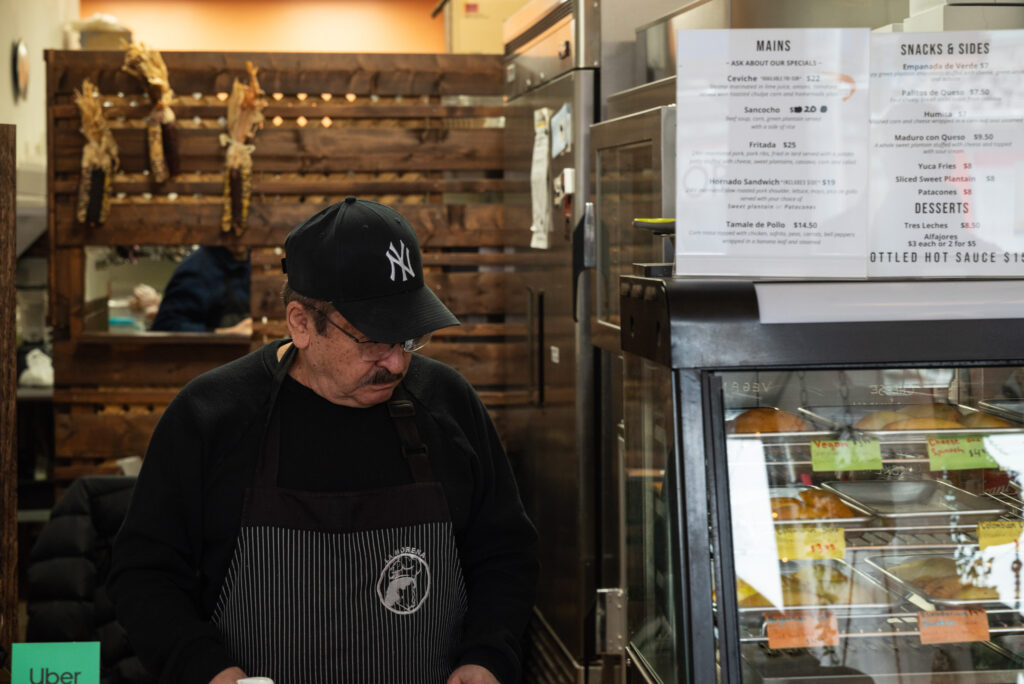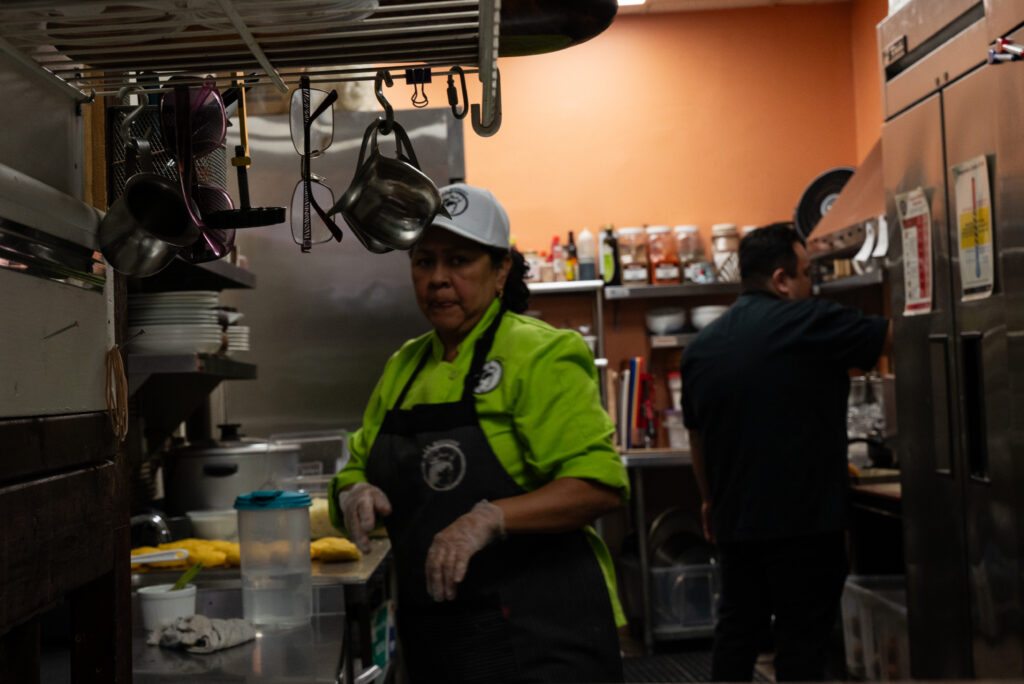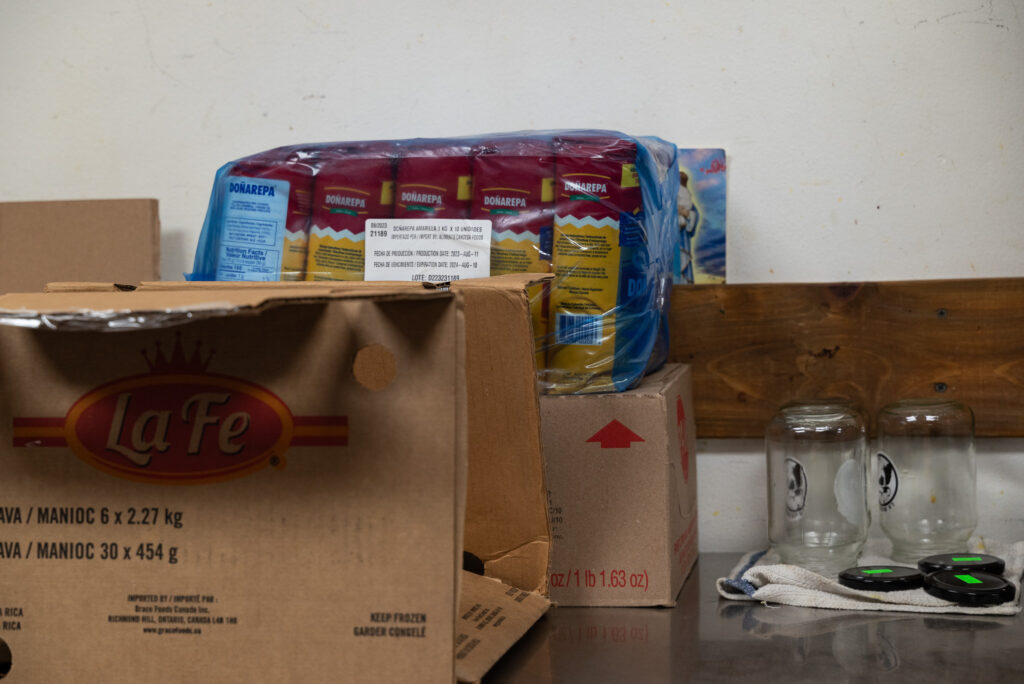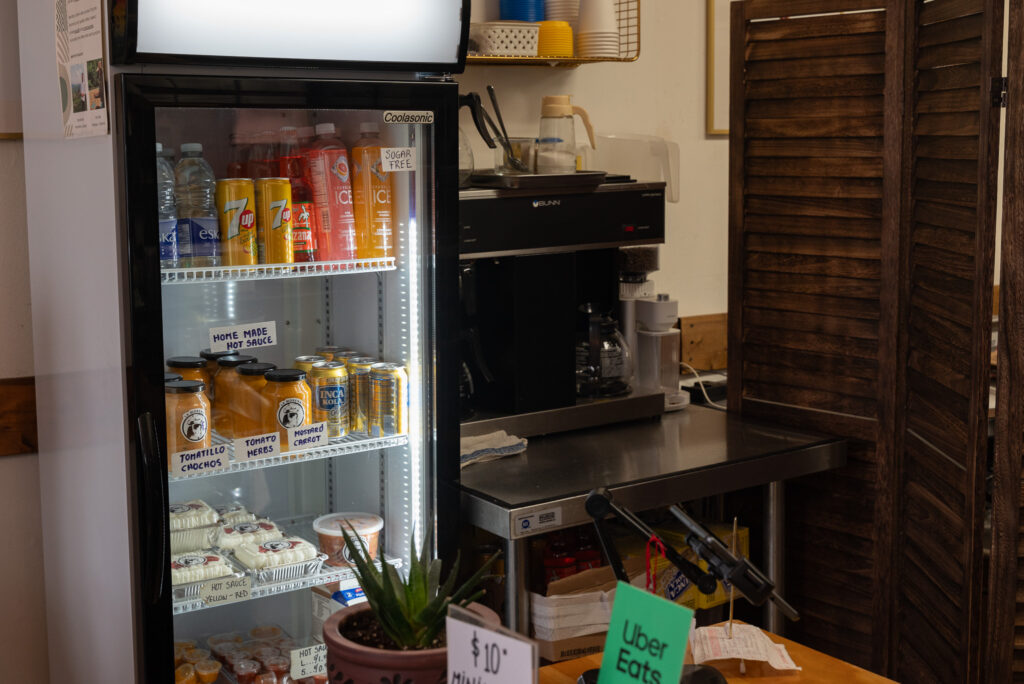By Gabriel Hilty
Listen to this article:
At lunch time, customers line up at La Morena, the mini café and passion project of Marcelo Rosero and his family. Often these lines consist of customers, who he knows by name, and they pour outside the doors and onto the pavement.
The small Ecuadorian eatery has community and family at its centre. “Ever since I remember, I’ve loved to share with people,” Rosero explained, reminiscing years back to growing up in Ecuador. “That’s the main thing.”
Corso Italia, the Toronto neighbourhood, doesn’t immediately jump out as somewhere you would find a small but thriving family business. This is the corner of St. Clair Avenue and Dufferin Street, an intersection of big roads and busy buses largely occupied by a swath of fast-food chain restaurants.

But this is what the incongruous La Morena has become: a space where locals can congregate and find a sense of belonging. It’s where regulars eagerly ask to see photos of Rosero’s youngest grandchild, which are shown with enthusiasm alongside stories of the infant’s crawling progress to the process of finding a daycare.
Stepping inside the café, the outside atmosphere is quickly swapped for a warmer one: colourful artwork and plants hang on the walls, and a steady stream of both traditional and modern South American music fills the space.
On the menu, the selection is small and tailored. It brings together traditional Ecuadorian recipes, along with those from all over South America. Empanadas from Argentina, Colombia, and Chile sit in a display case as the smell of coffee mixes with that of simmering soup and Ecuadorian tamales from the kitchen.
“My main concern was to do something different. The personality, and the variety in this small place is unique,” Rosero said.
Taking a break from serving behind the counter, Rosero, who is in his late 60s but moves with the energy of a younger man, sits at a table he made out of old crates from the previous tenants. His short, dark hair and mustache have a sprinkle of grey and match his black and white pinstripe apron and jet-black Yankees cap.
Glancing to the front, his son Andres Rosero, 30, accepts the latest Uber Eats order which his tablet ushers in with an annoying dinging sound. In the back of the café, Marcelo’s ex-wife Graciela Riofrio is in command of the kitchen. She is preparing to bring an order to the serving hatch and ring the bell.
Also from Ecuador, Graciela is the mother to their adult children Gabriela, Andres and David, the latter two who work alongside their parents at the eatery.
Marcelo Rosero opened La Morena just three months after his short-lived retirement, right before the COVID-19 pandemic in late 2019. Having been employed in more than 40 restaurants for nearly half a century, being cooped up in his house for more than one Sunday a week was simply too much.
“If you’re used to working every day, to moving around; you go home and sit down, you die,” he said with frankness.
His desire to work goes deeper than mere restlessness; he wants to share and serve the people in his community. Marcelo’s love for connection is a central part of his life, which originated in his growing up in Ecuador, where he started a camp for children.


Over the last years, an onslaught of challenges have brought instability to the restaurant industry: pandemic-related closures, inflation and a labour shortage are hurdles highlighted by experts and the industry group Restaurants Canada.
As a small, family-run establishment, La Morena has a harder time than larger businesses; Data from one market research firm shows chains absorbing higher expenses and expanding, while the number of independent restaurants is dropping.
Marcelo explained that in spite of all the challenges, the café started making money from the very first day.
This success is the culmination of decades of experience centred around Graciela, who has honed her culinary skills at catering events, festivals and Latin American restaurants throughout Toronto.
“She is the soul of the kitchen,” Marcelo said of his ex-wife.
With his mother’s cuisine being featured at places around the city, Andres said the original idea for La Morena was to have a place that could fully showcase her gastronomic talent.
Breaking between taking orders and bringing finished platters to the tables, he remembers when he used to design the packaging for his mom while she was still catering.
“I’ve always had a lot of faith in her, and La Morena is an extension of that,” Andres said.

The idea to convert the current space on St. Clair into a family café was a chance encounter: walking through the area, Marcelo spotted a ‘for rent’ sign posted outside and ran to talk to the landlord.
Using an initial investment of $40,000 in savings, the interior was transformed from an old sandwich and hotdog restaurant: fridges were installed, and the seating area moved from a traditional dine-in restaurant to a smaller set-up, which accommodates around six people.
The community spirit that jumpstarted Marcelo from his fleeting retirement made sure the café’s few tables and chairs were quickly and steadily occupied.
“My mom already had some fans that enjoyed her food. On our first day, it was supposed to be a soft opening, but we were packed,” Andres said.
Graciela’s small menu of staples also incorporates feedback for weekly specials and the occasional festive fare, including Thanksgiving turkey empanadas. Customers call in to request specific dishes they remember from childhood, such as the pork blood sausage soup Caldo de salchicha, or Guatita, a dish of beef tripe with rice and peanut sauce.
“The main thing was to try to introduce our food in this community.”
Marcelo Rosero
The work behind the deceptively simple menu starts early in the morning, with preparations getting done on Tuesday, the designated prep day. This includes working on the ever-popular Ecuadorian specialties.
Different types of empanada doughs are made from scratch: some consist of wheat flour and are easy to shape and stretch, while others are finicky and require a finer process. Made from cornmeal, Colombian-style empanadas call for a press to flatten the dough and a mold for shaping the turnovers, followed by a quick freeze to ensure they don’t fall apart.
The family’s dedication is on display when the café opens its doors on Wednesday. Graciela usually arrives at 7 a.m. to do prep work in the kitchen. At 9 a.m., the ovens start heating up for the day’s batch of baked empanadas.
The deep-fried restaurant staples, common in Ecuador, are also prepared and placed into the display case with the other varieties by opening time at 11 a.m., ready for the first customers of the day.

The growing expenses faced by the restaurant industry today are often too much for small business owners. At La Morena, the grassroots momentum since its 2019 opening has carried through, past the worst of COVID-19.
During the week, students from the nearby schools and adults working in the area stop by on their lunch breaks. The café also has regular customers from Ecuador, the wider Latin American community, and other fans hailing from a multitude of diverse backgrounds.
For Marcelo, the success of the café is the sum of the family’s passion and experience being united. He believes it’s this approach, and his commitment to community, that will carry the business into the future.
“We have a good chef, a really nice atmosphere, it doesn’t really look like a café,” he said. “People don’t care that they’re eating standing up because they are enjoying whatever we make. Success is the harmony when you put together all these effects.”
